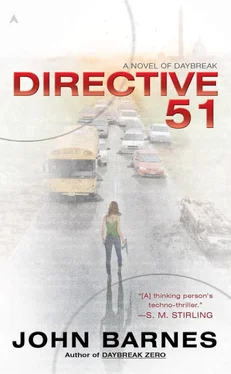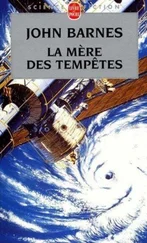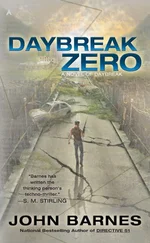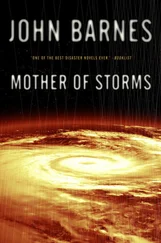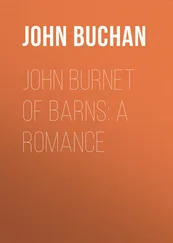“Let’s see if I can improv us something hot,” he said. “If I can build a fire quick, there’s aluminum foil in our friend’s groceries, and we could just dump some veggies and meat into packages of that and cook ’em Boy Scout style.”
“Okay, you gotta make that happen,” she said. “Because my mouth just started watering, thinking about it.”
Jason was proud of himself; he was able to solve the problem in about ten minutes all told. He began by pulling a respectable heap of deadwood out of the dry wash about fifty yards away from the pullout. Then he went back into the guy’s emergency kit, and sure enough, there was a gas siphon and a set of pull flares. He siphoned about a cup of gasoline into an empty Bud can and sprinkled that over his heap of dry wood; then he pulled the tab on a flare and shoved it into the pile. The dry wood, aided by the gasoline, caught at once.
While the fire burned down to a bed of coals, he dumped the formerly frozen vegetables in heaps on a long strip of the aluminum foil, added three slices of lunchmeat and some plaztatic petroleum cheese-like substance onto each heap, ran down the whole line with ketchup, mustard, pepper, and a dribbling can of beer (all the seasonings there were), and finally tore and folded the foil to enclose each heap and form a cookable package. The packages went directly onto the fire.
“That’s three times what we can eat,” Beth said.
“But I figure we eat a third and take the rest with us,” Jason said. “Even if I have to do it in a cardboard box on my shoulder. And if we don’t open the packets till we’re ready to eat them, they should keep pretty good.”
When Jason fished the packets out with a stick, and used the work gloves from the emergency kit to open two of them, they discovered how hungry they were; of the ten aluminum-foil-wrapped balls of food, they ate five there and then, gobbling down the impromptu gullion with their fingers as soon as it was cool enough to touch, washing it down with plenty of Mountain Dew and Coors. A bottle of Windex and a roll of toilet paper got their faces and hands tolerably clean afterward.
Though it was warm enough at the moment, the big, heavy sweaters from the back seat seemed like something they shouldn’t leave behind, so Jason tied them into fanny packs. Each sweater held two liters of Mountain Dew, plus snack chips, packages of cooked gullion, and a couple of lunchmeat sandwiches, enough to make it to Antonito, they hoped, which a sign said was seventeen miles away.
For a long time they just walked, and now and then Beth would reach out and take his hand with her good right hand. They stopped only once, when the Mountain Dew bottle in Jason’s sweater pack abruptly exploded, giving him a little bit of a bruise on the ass, soaking his back, drenching the sweater, and crushing some of the food. The bottle smelled like spoiling milk; so did the bottle from Beth’s pack, so they opened that and drank as much as they could; the liquid would do more good inside them than in the spoiling bottle. The warm fall sun dried his back fairly quickly, but the sweater still hung wet and cold against his ass, and the food in it was probably a soggy mess. Maybe, if we don’t make Antonito by dusk, I’ll build a fire and recook my packets to dry them out. Don’t know what I can do for the sandwiches; maybe wrap them in the used foil and bake them too?
They topped a long rise and looked down to where the road bent between two rock outcrops; there was a group of people down there, and a horse and wagon. Beth’s breath caught for a moment, and she asked, “Should we run?”
“They’ve already seen us and—hah. I think we’re fine.”
The little figure running lickety-split toward them was a girl of about ten, grinning and waving at them like a maniac.
Beth laughed with relief. “Yeah. Hostile people don’t send their children out to meet strangers.”
“Betcha they thought of that too.”
The girl rushed up and said, “Hi, I’m Gretchen Bashore, and I’m here to welcome you to Antonito, Colorado. Do you have any other people in your party or were you forced to leave any injured or disabled people behind?”
“There’s just us,” Jason said, smiling, “and we’re glad to see you.”
“Okay, are there any injuries in your party?”
“My left wrist is broken but I can walk,” Beth said.
“No other members in party, lady—uh—”
“Beth.”
“Lady named Beth has a broken wrist but can walk. Okay. Okay. Uh, material you are bringing in?”
“Just our clothes and a little food.”
“Okay, and the last one is skills you have?”
“We’re hard workers, good cooks, we can both do some fix-it stuff, and we can do organic gardening and raise chickens. Wilderness survival for me, and my name is Jason, and Beth can quilt, crochet, and sew, at least once her wrist heals.”
Gretchen repeated it back twice, and then said, “ ’Kay, back soon!” and rushed away. They were still more than a mile from the little cluster of people. “Might as well keep walking toward them,” Beth said. “We don’t want them to think we’re lazy.”
Shortly, the wagon, pulled by a big brown horse, came clopping up the road to them. Gretchen sat shotgun; the driver was a little, bearded gnome of a man who looked like he had been born to play a Western sidekick.
“Jason, Beth,” Gretchen said, carefully formal, “this is my dad, Dr. Jerry Bashore. He teaches art at Adams State College in Alamosa.”
“Or I did till four days ago,” Bashore said, tipping his straw cowboy hat to them as if he’d walked right out of the movies. His accent was much more Staten Island than Gabby Hayes, Jason thought. “Decided I’d better come out and pick you up; I know you can walk, but if your wrist is hurting, that’ll make you tired. I was just about to take a fresh batch of folks into town, anyway. Gretchen, give Beth a hand getting into the wagon bed.”
In the wagon, they discovered bales of straw, and Jason laughed. “You usually give hayrides in this thing!”
“Yep. Students loved ’em, extra money in tourist season, and it helped my two oat-burning buddies earn their keep. I’d already gotten the straw in for Halloween.”
There were four others waiting for their rides into town, which Bashore—“call me Doc, everyone does”—told them would be about four miles, an hour’s drive, “but you don’t have to work, the horses do. And they know the way better than I do.”
“So this thing is all made out of metal and wood?” Jason asked.
“Yeah, but I nearly had it seize up earlier today. The silicone grease turned to watery, sticky stuff, more like Elmer’s Glue than anything else. We had to take the hubs apart and re-grease ’em with fat from the Dinner Bell Café’s grease can. Also, I had a prairie schooner top for this, which would come in handy, except it was made of nylon with plastic tube ribs, and it turned into brown snot overnight. But there’s nothing electric, and no plastic fittings, on any of the parts that make it go. And I guess we can make another cover for it. Giddup, there, fellas, we have people to deliver.”
As far as Jason could tell, the horses moved no differently; probably that’s just for effect, he thought. That’s okay. Right now I’d take a masked man on a white horse followed by a whole troop of cavalry.
Something was shaking beside him; he turned and saw Beth crying, big wracking sobs, her whole body trembling. He put his arm around her and she buried her face in his shoulder, resting her injured wrist on his thigh. He stroked her, made soothing noises, and looked up at the blue sky, just now being invaded by high cirrus in the late afternoon—a sign that the warm chinook was about to be over and the first big storm of the winter was on its way.
Читать дальше
